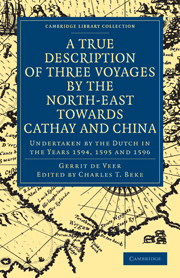 A True Description of Three Voyages by the North-East towards Cathay and China
A True Description of Three Voyages by the North-East towards Cathay and China THE FYRST PART OF THE NAUIGATION INTO THE NORTH SEAS
Published online by Cambridge University Press: 29 August 2010
Summary
As the art of nauigation more increaseth, so there are daily more new countries found out
It is a most certaine and an assured assertion, that nothing doth more benefit and further the common-wealth (specially these countries) then the art and knowledge of nauigation, in regard that such countries and nations as are strong and mightie at sea, haue the meanes and ready way to draw, fetch, and bring vnto them for their maintenaunce, all the principalest commodities and fruites of the earth, for that thereby they are inabled to bring all necessary things for the nourishment and sustentation of man from the vttermost partes of the world, and to carry and conuay such wares and marchandizes whereof they haue great store and aboundance vnto the same places, which by reason of the art of nauigation, and the commodities of the sea, is easily to be effected and brought to passe. Which nauigation as it dayly more and more increaseth (to the great woonder and admiration of those, that compare the sea-faring and nauigation vsed in our forefathers times, yea and that also that hath beene practised in our age, with that which now at this present is daily furthered and sought out) so there are continually new voiages made, and strange coasts discouered; the which although they be not done by the first, secod, or third voiage, but after, by tract of time, first brought to their full effect, and desired commoditie, and the fruits thereof, by continuance of time reaped.
- Type
- Chapter
- Information
- A True Description of Three Voyages by the North-East towards Cathay and ChinaUndertaken by the Dutch in the Years 1594, 1595 and 1596, pp. 1 - 258Publisher: Cambridge University PressPrint publication year: 2010First published in: 1853


